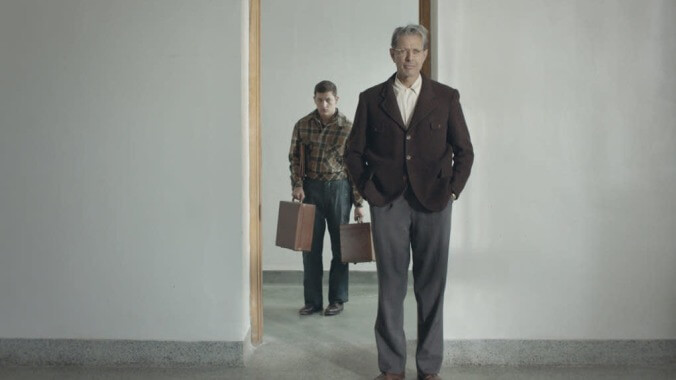Jeff Goldblum darkly tweaks his eccentric charm as a door-to-door lobotomist in The Mountain


The vision of 1950s America presented by The Mountain, Rick Alverson’s strikingly glum midcentury drama, bears little resemblance to the one that’s come to dominate the pop-culture imagination. There are no white-picket fences, no ostentatious displays of economic prosperity, no hallmarks of Space Age newness—none of the cosmetic clichés that even a withering film about the era might deploy as ironic contrast, the shiny mirage hiding all of our dark secrets and impulses. Shot in the boxy, archaic Academy ratio, which only serves to further deglamorize its spaces, The Mountain expresses the repression of its depicted decade in visual terms: Wood-panel browns and hospital-hallway vanillas color an America so drab it threatens to fade away before our very eyes. Maybe we’re just seeing it through those of its unluckiest characters, the ones who have had a sharp object jammed into them, forever dimming the light of their cognition under the dubious pretense of “treatment.”
The Mountain is set during a time when transorbital lobotomies were still regularly performed, before the medical community rejected the barbaric practice. That makes it the first official period piece from its writer-director, but hardly a change of pace. Alverson has always been interested, some might say exclusively, in malaise—he makes abrasive, depressive meditations on American alienation. Many of these films have been structured around the personalities of a star, placed in a dispiriting new context; The Comedy, for example, presented Tim Heidecker’s confrontational anti-humor as a millennial defense mechanism, while Entertainment spun a sad-clown odyssey of despair for Neil Hamburger, the stand-up-comic alter-ego of Gregg Turkington. In The Mountain, Alverson latches onto the charismatic eccentricity of Jeff Goldblum, casting the much-memed actor as Dr. Wallace Fiennes, an itinerant physician who uses a small pick and silver hammer to sever cerebral connections.
Fiennes is probably based on Walter Freeman II, a real lobotomist from the ’50s often described as a flamboyant character. He was also, by most accounts, a dangerous quack who charged just $25 per procedure, killing a good 15% of his patients and causing irreparable brain damage to many others—including, most famously, John F. Kennedy’s sister, Rosemarie. In The Mountain, Goldblum’s approximation of this real-life monster is basically a traveling salesman: a snake-oil huckster just starting to face the reality that his days inhumanely working the asylum circuit are numbered. The film unfolds not from his perspective but that of Andy (Tye Sheridan, who appeared, too, in Entertainment), a perpetually reserved ice-rink employee still coping with the death of his domineering figure-skater father (Udo Kier). Dr. Fiennes, or “Wally,” who treated Andy’s institutionalized mother, invites the young man to become his assistant, out of some mixture of guilt, pity, and genuine need.
That makes The Mountain, like Entertainment, a kind of haunted road movie, following this mismatched pair as they go town to town, plying an unconscionable trade at any institution that hasn’t turned to alternative methods and medications. Andy, who takes pictures of the patients for the families (always before the surgery, so as not to immortalize the unsightly swollen tissue), is disturbed by the operations, which involve inducing seizures through electro-shock, then pounding the pick into the lower eye socket; those who don’t die on the table are left in a docile state just short of vegetative. “Where do they go?” Andy asks his new mentor/father figure. “The people, after we change them?” He identifies, to an increasing degree, with the patients. The question of whether Fiennes, a drunken lecher when not on the job, lobotomized Andy’s mother isn’t left hanging for long. Once revealed, the information colors almost ever interaction between the two men.
The images, courtesy of Lorenzo Hagerman, have a painterly quality: For all the sharp midcentury detail, there’s a certain vague unreality to them—appropriate for a film partially about the difference between the world and how it’s distorted through presentation. (Would lobotomy ever have been accepted anywhere were it not for the perception that it was helping the patients?) At times, The Mountain possesses the atmosphere of a bad dream, the kind built on awful inevitability. Occasionally, it explicitly blurs the line between waking and sleeping life, Andy’s unarticulated sexual desires butting their way into his world—scenes that connect uneasily and abstractly with the way Freeman’s procedure was sometimes used as a method for “curing” homosexuality. Perhaps not surprisingly for a filmmaker with ties to Adult Swim, Alverson favors very pregnant pauses. He also maintains an interest in oddball supporting characters, sometimes detrimentally: When Andy and the doctor reach a California mountain town in the grips of a New Age spiritual movement, the great French shape-shifter Denis Lavant all but hijacks and derails the movie with some incongruous, over-the-top mugging, playing a healer who wants a lobotomy for his daughter (Hannah Gross).
Perhaps the filmmaker thought he needed some counterbalance to the overwhelming, even single-note moroseness of his material—and his protagonist. Is it a joke or something more, something sadder, that Sheridan’s taciturn introvert almost seems as distant as the bad doctor’s victims, never so much as cracking a smile and rarely speaking above a murmur? Perhaps The Mountain is after a larger point about the way American life pounds people into sedation, no icepick required. Either way, the movie itself sometimes feels a bit lobotomized. But never when Goldblum is on screen. He plays Freeman as a deluded fraud, horrifying but a little funny, too, in that stuttering, seductive Goldblum way. The doctor has, in some respect, quieted his own demons through denial, pathologically insisting his methods are helpful, as a gift to those he mentally incapacitates and their grateful families. One can imagine a film plunging and piercing deeper into his disturbed mind.